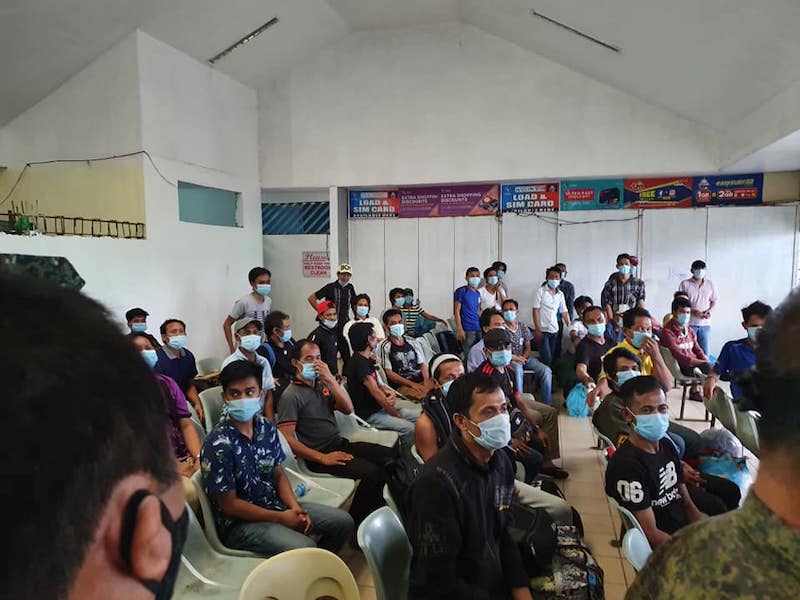ZAMBOANGA CITY (MindaNews / 05 July) — The first batch of returnees from Sabah, Malaysia arrived in Tawi-tawi on Friday, as representatives of the inter-agencies met them at Bongao Port, then led them to their respective home towns, cities and provinces.
Ivan Salvador, Information Officer of the Department of Social Welfare and Development Regional Office 9, said the 395 returnees in the first batch are among 5,000 Filipinos who have undocumented status in Sabah and were deported by the Malaysian government for want of valid or legal documents.
“All the 395 are undocumented persons (in Sabah). Some resorted to back door entry, some are victims of human trafficking,” he said.
 Three hundred ninety five Filipinos arrive in the port of Bongao, Tawi-tawi from Sabah, Malaysia on Saturday, 04 July 2020, the first batch among 5,000 deportees. Bangsamoro Minister on Local Governments Naguib Sinarimbo said the returnees went through an RT-PCR testing in Sabah and their results are negative of the virus that causes COVID-19. Of the 395, 306 are from Tawi-tawi but they will still undergo a 14-day quarantine at the Bongao Trade School before they are sent home. Photo courtesy of Minister Sinarimbo
Three hundred ninety five Filipinos arrive in the port of Bongao, Tawi-tawi from Sabah, Malaysia on Saturday, 04 July 2020, the first batch among 5,000 deportees. Bangsamoro Minister on Local Governments Naguib Sinarimbo said the returnees went through an RT-PCR testing in Sabah and their results are negative of the virus that causes COVID-19. Of the 395, 306 are from Tawi-tawi but they will still undergo a 14-day quarantine at the Bongao Trade School before they are sent home. Photo courtesy of Minister Sinarimbo
The Philippine Coast Guard vessel that met the returnees in Bongao displayed the message on its LCD screen: “Welcome Home Filipino Returnees from Sabah. We Love You All!”
Jamila Arasid, Social Welfare Officer of the Bangsamoro region’s Ministry of Social Services and Development (MSSD) in Tawi-tawi provided a list of 395 returnees, 306 are from Tawi-Tawi, 35 from Sulu, 13 from Basilan, 12 from Zamboanga City, eight from Zamboanga del Norte, five from Zamboanga del Sur, four from Zamboanga Sibugay, and 12 others are from other cities and provinces — two each from General Santos City and La Union and one each from Cebu, Negros Occidental, Davao City, Bukidnon, Lanao del Sur, Bohol, Cavite and Siquijor.
Of the 306 from TawiTawi, 188 are from Bongao, 61 from Sitangkai, 16 from Sibutu, 14 from Tabawan, 10 from Cagayan de TawiTawi, eight from Sapa-Sapa, five from Simunul, two from Panglima Sugala and one each from Tandubas, and Languyan.
The 354 returnees from Tawi-tawi, Sulu and Basilan are under the MSSD of the Bangsamoro region while the 29 returnees from Zamboanga City and the three Zamboanga provinces are under the DSWD in Region 9 or Zamboanga Peninsula.
Salvador said the 306 from Tawi-Tawi will be confined in the province’s designated quarantine facilities in the different municipalities for 14 days. He said the arrangements for quarantine in the municipalities depends on the LGU (Local Government Unit.” He said that upon arrival, they were first accommodated at the TawiTawi School of Arts and Trade in Bongao for meals and rest.
The DSWD Team that travelled to Bongao with the Philippine Coast Guard was led by Regional Director Fatima Caminan.
Two ministers from the Bangsamoro Autonomous Region in Muslim Mindanao were present: Raissa Jajurie, Minister of Social Services and Development and Naguib Sinarimbo, Minister of Interior and Local Government.
Salvador told MindaNews there is another batch coming in 15 days. Malacanang, he said, wants to ensure they can come home from Malaysia. He said the local government untis have reintegration plans to address the social needs of these returnees.
“The DSWD provides assistance and social services to them, including Hygiene Kits, Family food packs like rice, canned goods, cereals and others, Family kits to include mats and blankets. TawiTawi Governor Mang Sali provided sleeping materials for TawiTawi returnees,” Salvador added.
“Although what is happening is an inter-agency coordination by the Provincial Social Welfare and Development Officers, Heads of Government, national government agencies and provincial counterparts, in the different clusters, the social services are but an augmentation to the re-integration program readied by the receiving LGUs,” Salvador explained, adding that before going back to their respective areas, the local governments and agencies shall have addressed the needs of the returnees, such as jobs.
“Part of intercare services ito, para pagbalik sa community, meron silang livelihood, skills training, para di na sila bumalik sa Sabah, to look for better opportunities” (This is part of the intercare services, so that when they return to their community, they have livelihood and skills training, so that they do not go back to Sabah to look for better opportunities), he said. (Frencie Carreon, MindaNews)
